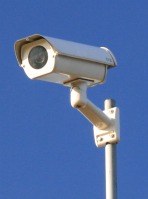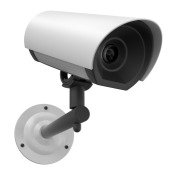"Is Digital Home Video Surveillance for You?"
There are two main types of home video surveillance. The first is analog CCTV surveillance. Click on this link to find out more about CCTV Security Systems.
This section is specifically for IP Video Technology.
What are your Needs?

There is a huge range of options regarding home video surveillance. You need to figure out what your security strategy is and how surveillance fits in.
This comes first in determining the type of surveillance system and camera you want to help protect your family and valuables.
Some questions that you should ask yourself include: Would you like to view the images remotely? Would you like to hear audio from the video? How much storage do you need? What type of resolution do you need?
Digital Video Surveillance
Use the Internet
With a digital home video surveillance system, you will be able to use the Internet as the security system backbone. Cameras capture the images and transmit images over the Internet. The images can be viewed in real time from various devices ranging from computers and PDA's to cell phones.
There is no need to deal with cabling such as in CCTV systems. This can allow for efficient and cost-effective installations and set-ups.
Easy Recording and Finding
You can also record images in off-site locations. Because everything is digital, you can store images on servers and network video recorders. You will be able to quickly search and access video from certain times and dates.
Easy to Add Cameras
Also, with digital home video surveillance, you will be able to add cameras to the surveillance system relatively easily.
Video Management Software
The software of the home video surveillance system is a key aspect of the entire security system. To be able to view multiple cameras you need video management software.
The software can provide live viewing, recording, and retrieving of video footage.

Certain software packages are more sophisticated and can look at multiple cameras at once. Some of the really advanced software packages can even perform advanced video analytics including facial recognition.
Cameras
There are several types of IP cameras. Fixed cameras are set to view and monitor a specific location. Fixed dome cameras have a fixed camera inside dome housing. The housing helps to conceal the direction the camera is facing.
PTZ Cameras are not fixed. They allow the user to monitor wider areas and zero in on different types of locations. Network dome cameras allow the user to pan up to 360 degrees. Also, since it is a dome camera, the camera is better guarded by the dome housing.
There are megapixel cameras. These cameras have extremely high resolution for a very wide field of view. If there are multiple cameras viewing an area, one megapixel camera might be able to cover the same area with a high level of quality. They are appropriate for high security areas like banks and airports. For a residence, you probably do not need this level of detail.
Security Camera Features
There are various lens features on cameras to get the quality of image that you are looking for. Here are a few of the features.
- Varifocal lenses allow you to zoom in and out to get different viewing angles.
- Auto Iris features automatically adjusts the cameras for different lighting conditions.
- Infrared illuminators allows the camera to take pictures in darkness.
There are also different types of housing available for your camera. There is vandal resistant housing to help protect your camera. There are dome housing options available to help conceal the direction that the camera is facing. There is also outdoor housing to help protect the camera from the elements.
Motion detection is also very helpful for security cameras. If motion is detected, the camera will get triggered to start viewing. This will help with bandwidth and security storage space.
You also have the option of hooking up the motion detector with lights or security alarms.
Security Considerations
There are a number of variables that you will need to consider when purchasing and installing home video surveillance systems.
For your house security, HomeSecurityReviewer.com feels that a bare-bones system will more than fit the needs of your security strategy. Of course, it depends on your situation.
You probably do not need long term storage. A retailer will probably want to keep storage longer because they might want to review events from a few weeks prior. If nothing goes wrong, you probably do not need to look back on surveillance video.
You also probably do not need continuous monitoring. A motion detector will help tremendously.
Also, you do not need the level of video resolution that some systems have. For home security, you are looking to detect and deter and you can do that adequately fine with a lower level of resolution.
Related Content:
Find out more about a Digital Video Surveillance Camera



